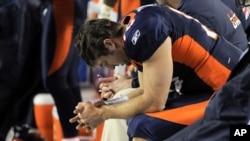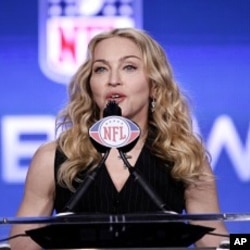The New York Giants and the New England Patriots face off February 5 in the NFL championship. The game, known as the Super Bowl, will be played in Indianapolis, Indiana and ends a season in which expressions of faith on the field by a player from another team ignited controversy.
Denver Broncos quarterback Tim Tebow played with Bible verse numbers painted under his eyes. After victories, he dropped down on one knee to pray and talked about his faith in the locker room.
"First and foremost, I just want to thank my Lord and savior, Jesus Christ," Tebow would tell reporters who asked him about the game.
The Broncos almost made it to the Super Bowl but lost to the Patriots during the playoffs, despite a winning streak with Tebow as quarterback. But his displays of faith sparked a nationwide controversy, with many football fans inspired by it and many others mocking it.
Most National Football League teams have spiritual advisers. George McGovern, the chaplain of the Super Bowl-bound New York Giants, said he does not believe God takes sides in sports, but understands that people might attribute a divine hand to Tebow's success.
"Here's a man who took a losing team, and made it a winning team, even though he's not that good a quarterback," McGovern said.
Tebow is now a hero to fellow evangelical Christians who have promoted sports as a way of reviving Christian faith in American society.
Dan Britton is executive vice president of Ministry Programs at the Fellowship of Christian Athletes. It runs thousands of summer camps and Bible study and prayer groups at schools and colleges across the country.
"We believe that if an athlete separates their faith and sports then actually their faith isn't real," Britton said.
Tebow is just the latest in a string of players going back to the 1970s to bring their faith onto the field. But the origins of evangelical Christians' interest in football go back further.
Tony Ladd, director of athletics at Wheaton College, an evangelical school in Illinois, and co-author of the book, "Muscular Christianity," says that in the late 19th century, evangelicals worried about declining religiosity among American men and found that sports provided a framework to reach them.
"So it became a generating kind of using muscular - using sport in other words - activity to both evangelize and bring those men into a culture of Christianity," explained Ladd.
He says "Muscular Christianity" led to the creation of the Young Men's Christian Association, or YMCA. In the United States, the Fellowship of Christian Athletes was founded in 1954 and preachers such as Billy Graham used famous sports figures to attract large crowds.
"Football has always lent itself to this kind of appropriation or projection if you will, project your own values onto the game," noted Michael Oriard, who played for the Kansas City Chiefs in the 1970s and is now a professor at Oregon State University.
He says that has only become more pronounced with ceremonies such as Air Force flyovers that connect the game with patriotic fervor.
The singer Madonna - who is known for her explorations of spirituality - will perform at halftime at the Super Bowl. She called it "the holy of holies in America."
"Football is symbolically, theatrically, dramatically really powerful," Oriard said. "One of the things that's different between the football we play compared to the football that the rest of the world plays - that we call soccer - is, by giving the ball to one side or the other, and allowing it to keep that ball, so long as it can advance it and all that sort of business, we've built a more dramatic structure into it. So there's an ebb and flow in an American game that's quite different from the more rapid up and back of, say, soccer."
So while religion finds its way into professional sports around the globe - as many soccer players cross themselves during a game - Oriard says American football has also become a stage where conflicts over cultural values are played out.





